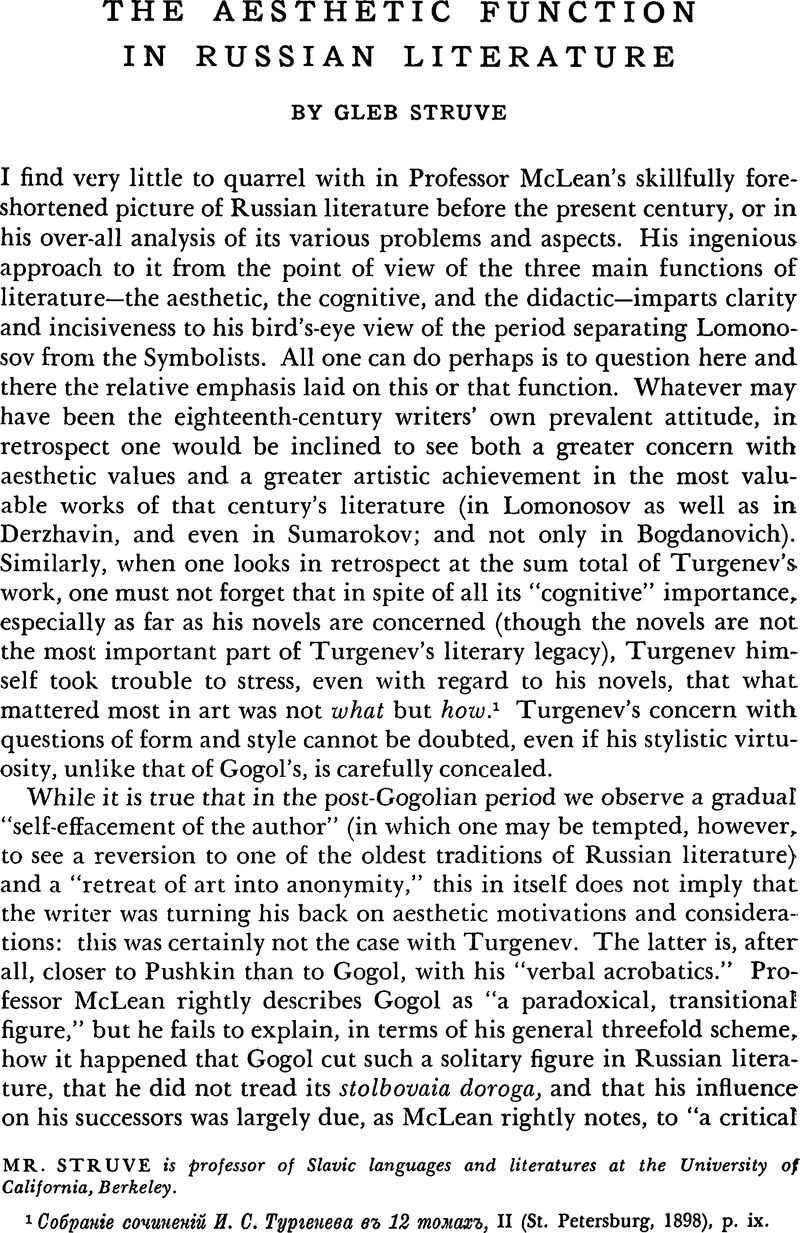No CrossRef data available.
Article contents
The Aesthetic Function in Russian Literature
Published online by Cambridge University Press: 27 January 2017
Abstract

- Type
- Discussion
- Information
- Copyright
- Copyright © Association for Slavic, East European, and Eurasian Studies. 1962
References
1
![]() , II (St. Petersburg, 1898), p. ix.
, II (St. Petersburg, 1898), p. ix.
2
![]() (Paris, 1934), p . 86.
(Paris, 1934), p . 86.
3 Boris, Pasternak, Doctor Zhivago (New York, 1958), p. 285.Google Scholar
4
![]() (Moscow, 1911), passim.
(Moscow, 1911), passim.
5
![]() (New York, 1955), p. 196.
(New York, 1955), p. 196.
6 See 3. ![]() (Moscow, 1961), pp. 18-21 and 422-26. On p. 19 will be found references to some other attacks on Jakobson.
(Moscow, 1961), pp. 18-21 and 422-26. On p. 19 will be found references to some other attacks on Jakobson.
7 G leb, Struve, Soviet Russian Literature: 1917-1950 (Norman, Okla., 1951), pp. 368–72 Google Scholar. See also my article “The Puzzling Theory of Socialist Realism” in The Creative Artist in Communist Society, ed. Henry W. Burke (Washington, D.C., 1959).
8
![]() , Nos. 9, 10, and 11, 1961, passim.
, Nos. 9, 10, and 11, 1961, passim.
9 Ibid., No. 9, pp. 106-8.
10
![]() , March 28, 1961.
, March 28, 1961.
11
![]() , February 27,1962.
, February 27,1962.
12 Zelinsky, K, “Russian Poetry Today,” Survey (London), No. 40 (January, 1962), p. 51 Google Scholar. Zelinsky's essay was written for an Italian survey of Modern European poetry, edited by Dr. Olga Muzio and to be published by the Casa Editrice Morcelliana.
13
![]() , I (Moscow, 1961), 420, No. 11980.
, I (Moscow, 1961), 420, No. 11980.
14 See Alan Moray Williams, “Ces contes d'Abram Tertz sont-ils des faux ou de nouveaux ‘Kafka'?” Figaro littéraire, April 7, 1962.
15 Some interesting speculations about Tertz are found in Stefan Bergholz's introduction to the Polish edition of Fantastic Tales—Opowieści fantastyczne (Paris, 1961): “Czytając Terca (Zamiast przedmowy),” pp. 7-76. See also what is apparently a greatly abridged English version of it: “On Reading Tertz,” Survey, No. 41 (April, 1962), pp. 145-50.
16 Edmond Taylor, “How the Russians Wage Political Warfare,” The Reporter, May 10, 1962, pp. 16-20. On the other hand, Peter Viereck's reportage on Soviet literature today, published somewhat earlier in The Reporter (“The Split Personality of Soviet Literature,” March 15, 1962, pp. 23-27), seems to me to err on the side of wishful political inferences and to draw some unjustified analogies.
17 A year ago I read a paper on this subject at the Far Western Slavic Conference in San Francisco, and I hope one day to publish an extended version of it.
18
![]() (Moscow, 1959), p. 33.
(Moscow, 1959), p. 33.
19 Ehrenburg in his memoirs quotes Babel's opinion of Nabokov as a writer who “knows how to write but has nothing to write about“(![]() , No. 9, 1961, p. 147).
, No. 9, 1961, p. 147).
20
![]() , 1961, p. 14. The text of Paustovsky's Introduction was also reproduced, as part of the forthcoming second volume of his
, 1961, p. 14. The text of Paustovsky's Introduction was also reproduced, as part of the forthcoming second volume of his ![]() (Kaluga, 1961); this collection of poems (including some unpublished ones by Marina Tsvetaeva and Nikolai Zabolotsky), stories (also one by Tsvetaeva), sketches, and essays, has been likened, for its unorthodox and independent spirit, to
(Kaluga, 1961); this collection of poems (including some unpublished ones by Marina Tsvetaeva and Nikolai Zabolotsky), stories (also one by Tsvetaeva), sketches, and essays, has been likened, for its unorthodox and independent spirit, to ![]() , which was the literary sensation of 1956 and the high point of the so-called thaw.
, which was the literary sensation of 1956 and the high point of the so-called thaw.


